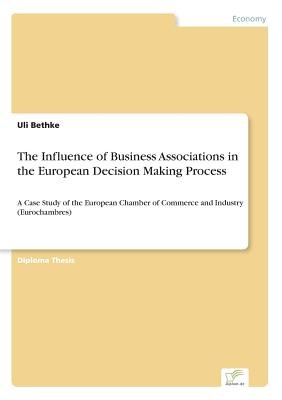
- Išsiųsime per 10–14 d.d.
- Autorius: Uli Bethke
- Leidėjas: Diplom.de
- Metai: 2006
- Puslapiai: 118
- ISBN-10: 383869256X
- ISBN-13: 9783838692562
- Formatas: 14.8 x 21 x 0.7 cm, minkšti viršeliai
- Kalba: Anglų
- Extra -15 % nuolaida šiai knygai su kodu: ENG15
The Influence of Business Associations in the European Decision Making Process + nemokamas atvežimas! | knygos.lt
Atsiliepimai
Aprašymas
Inhaltsangabe: Abstract: Since the adoption of the Single European Act (SEA) in 1986 more and more competencies have been transferred by EU Member States to decision makers in Brussels. Beside the objective of the completion of the Single Market the scope of Community policies has widened to political co-operation, technological development, and social policy. In addition, the powers of the European Parliament were strengthened and qualified majority voting was introduced for decisions related to the completion of the internal market. Since the summits of Maastricht and Amsterdam European integration has further gained in momentum. National governments again handed over sovereignty to the European level. Jacques Delors' famous quote that 80% of regulations impacting on the economic sphere were decided in Brussels today demonstrates the shift of competency. Within the last 15 years Brussels has become an important centre of power. This transference of power to the European level also has affected the behaviour of interest groups. Before 1986 it usually was sufficient to lobby the own national administration in order to influence regulations. The main function of European peak organisations at the time was on the one hand to monitor events in Brussels and report them back to their member federations on the other hand they formed a transnational network for the exchange of information. The growing power of European institutions and the strengthening of the supranational element within the European Union required interest groups to broaden their participation in the European decision making process. In addition, the technical problems regarding the realisation of the internal market, e.g. harmonisation of services, standardisation of products etc. has triggered off an enormous demand for technical input on the side of the European institutions. Since the adoption of the SEA, thus, interest groups have proliferated. New groups with new interests have emerged. Long eEXTRA 15 % nuolaida
Kupono kodas: ENG15
Akcija baigiasi už 06:38:58
Nuolaidos kodas galioja perkant nuo 10 €. Nuolaidos nesumuojamos.

- Autorius: Uli Bethke
- Leidėjas: Diplom.de
- Metai: 2006
- Puslapiai: 118
- ISBN-10: 383869256X
- ISBN-13: 9783838692562
- Formatas: 14.8 x 21 x 0.7 cm, minkšti viršeliai
- Kalba: Anglų





Atsiliepimai